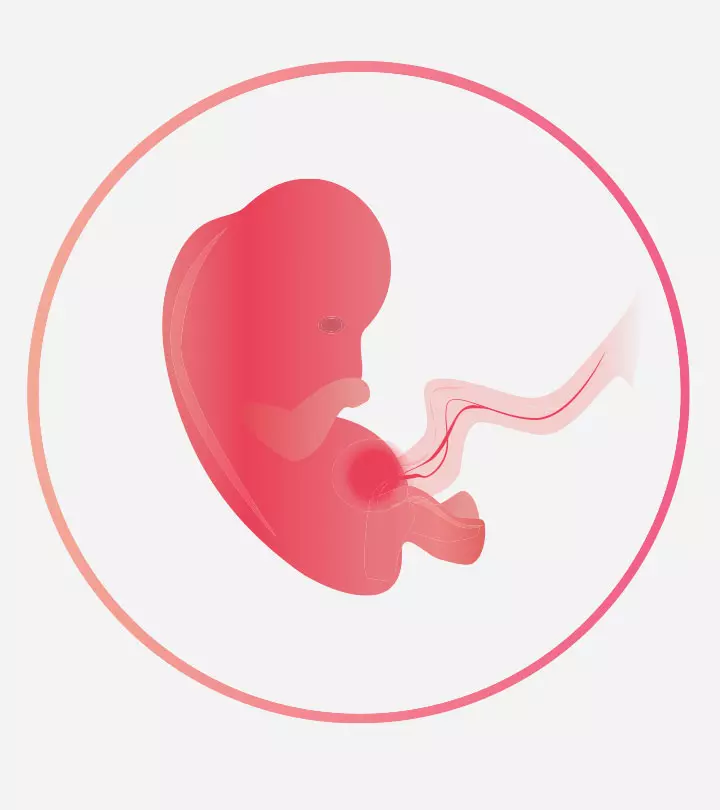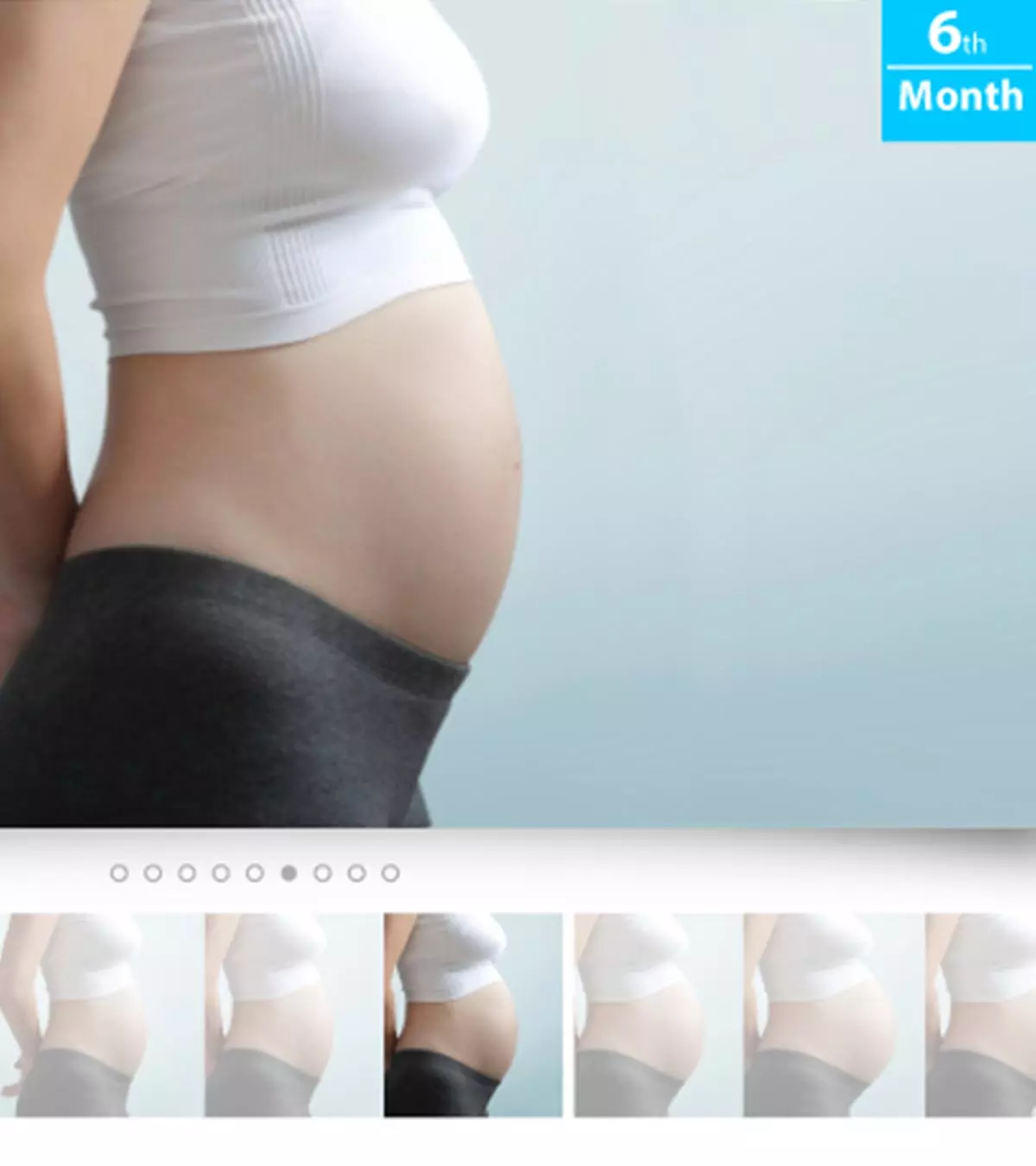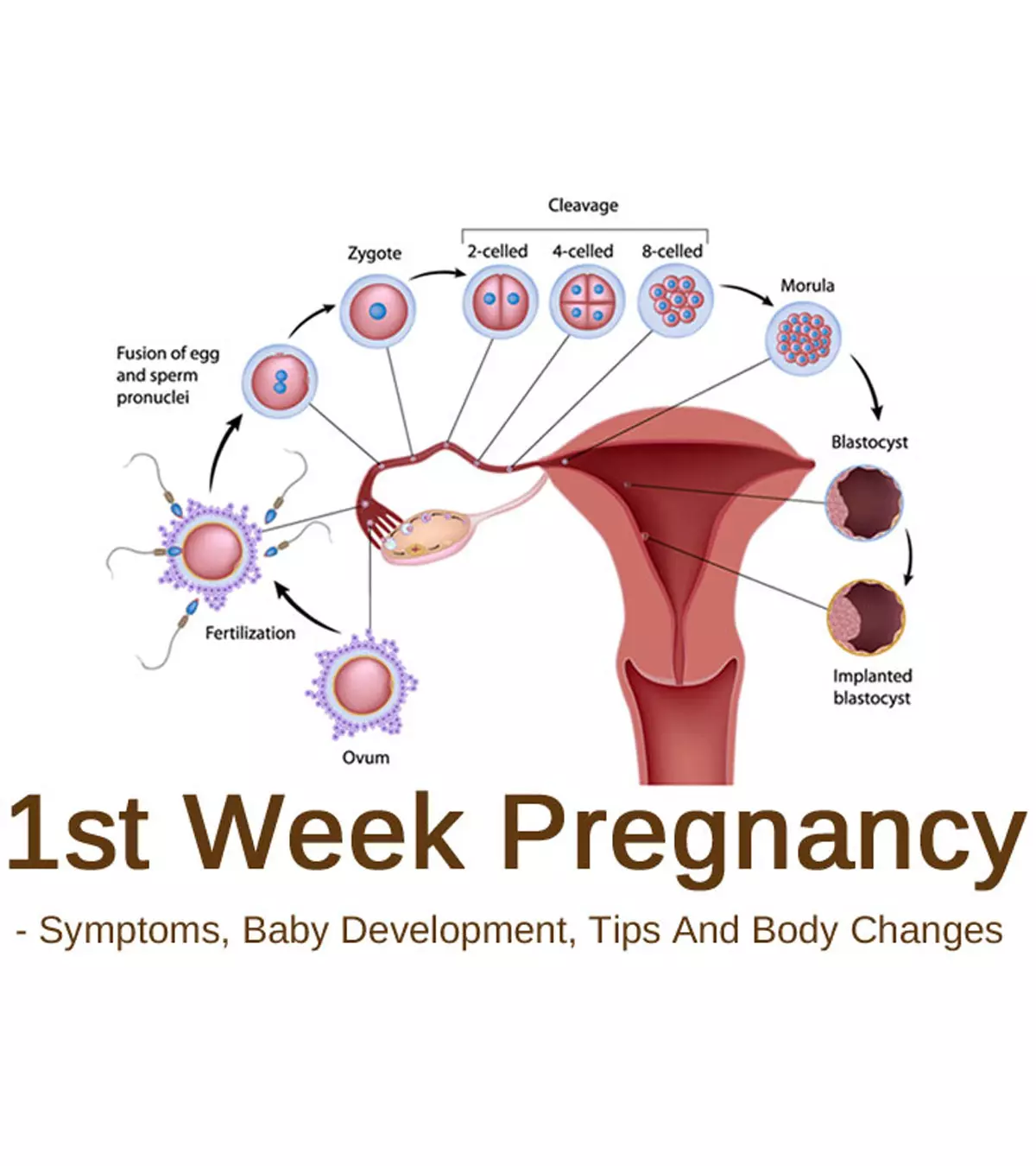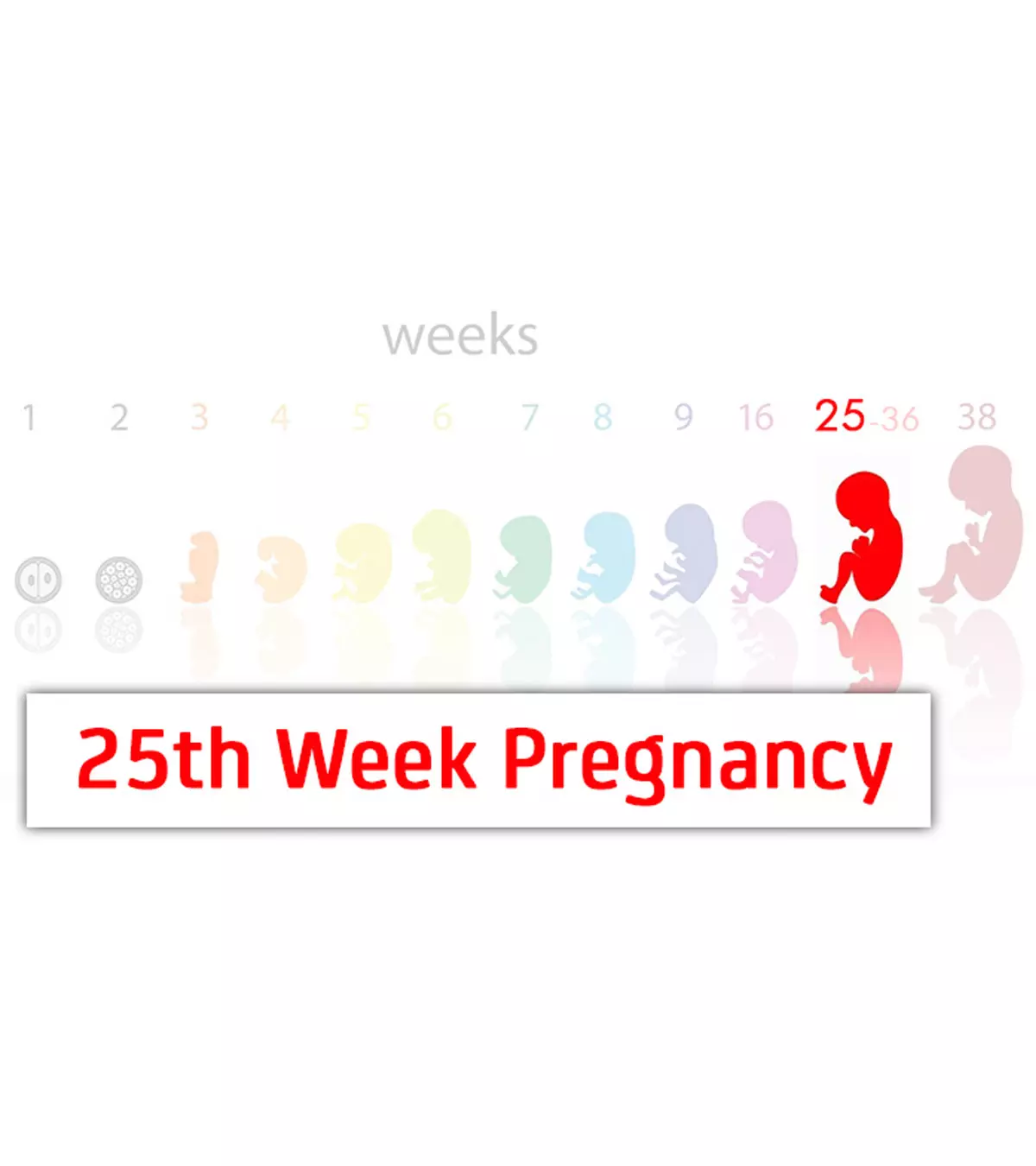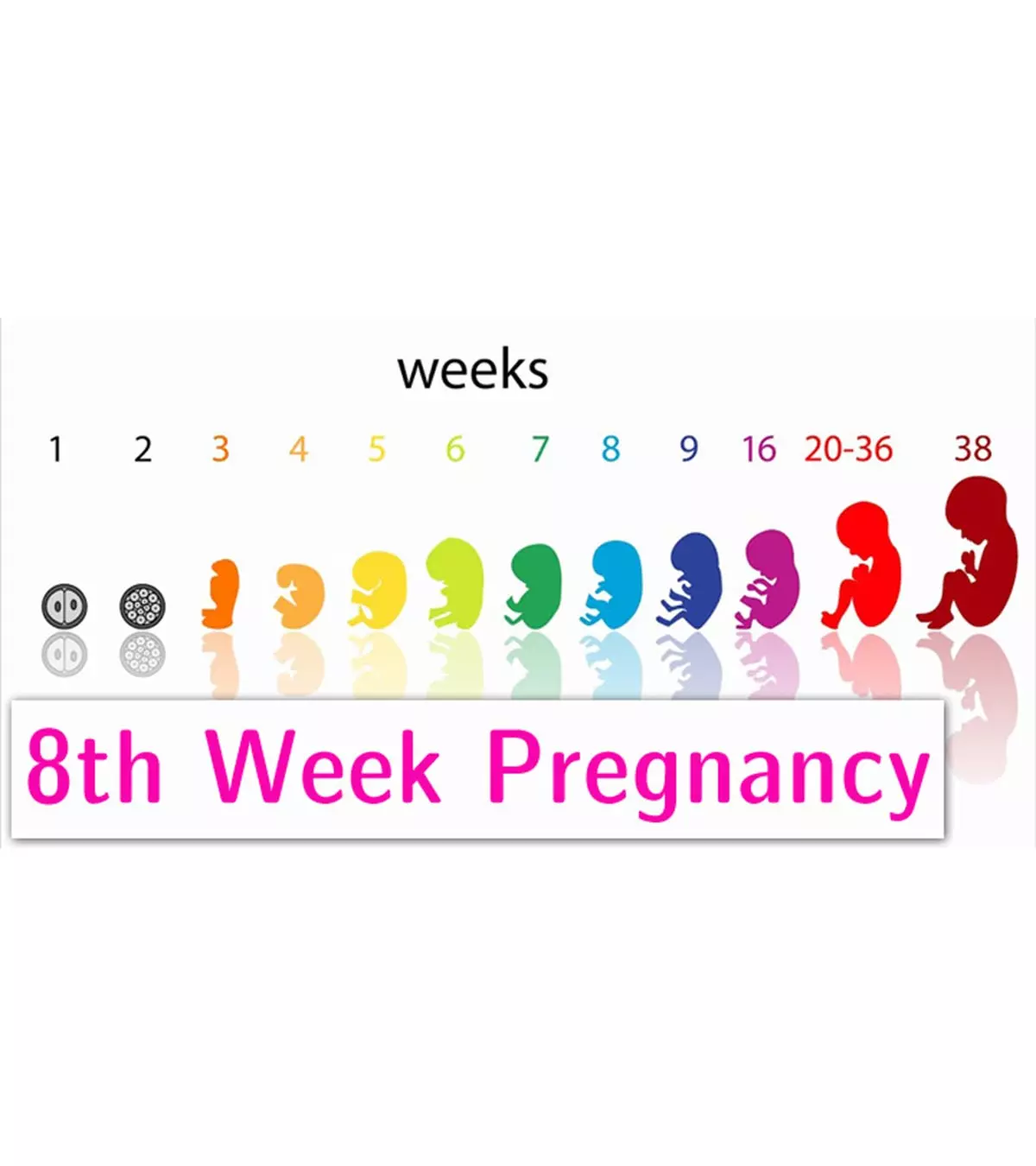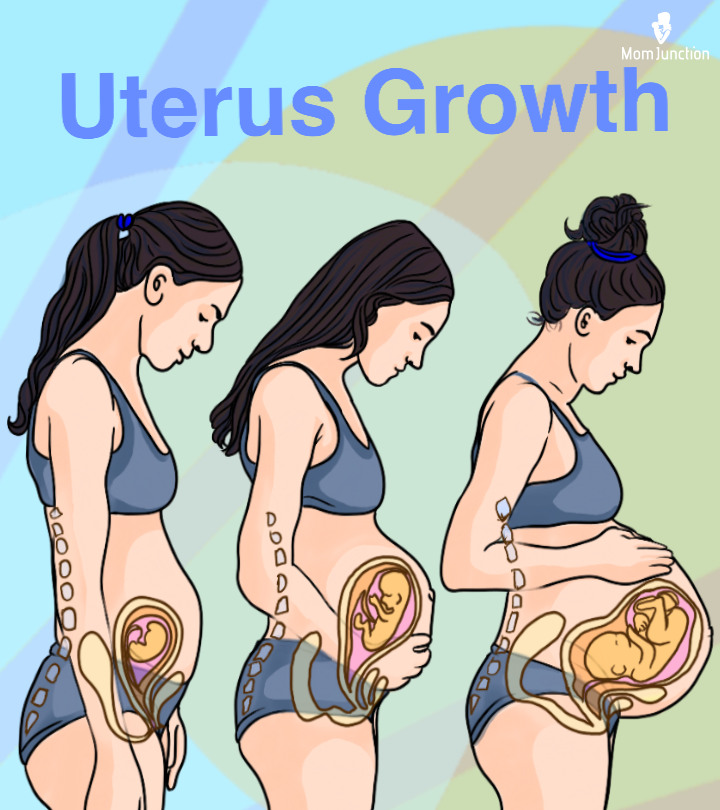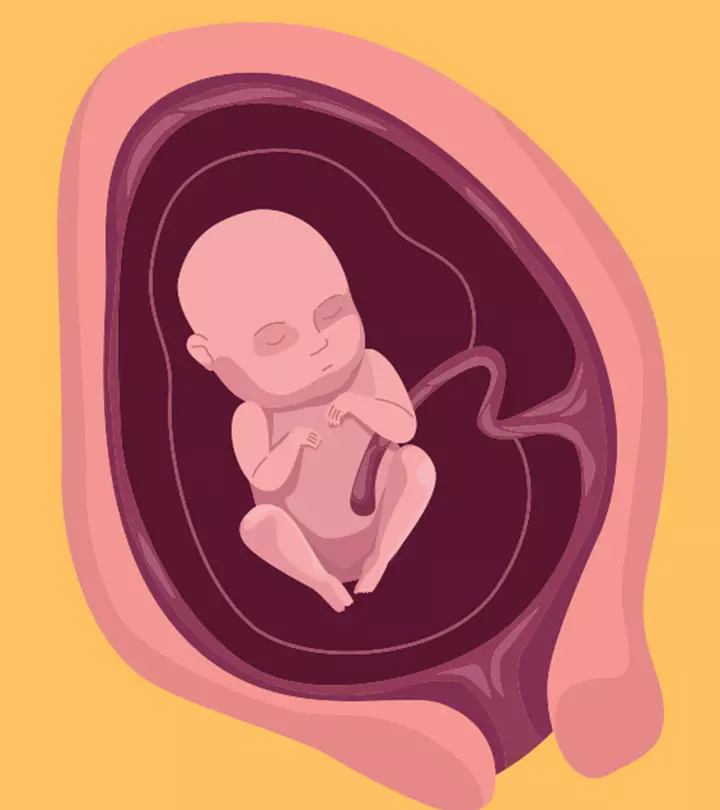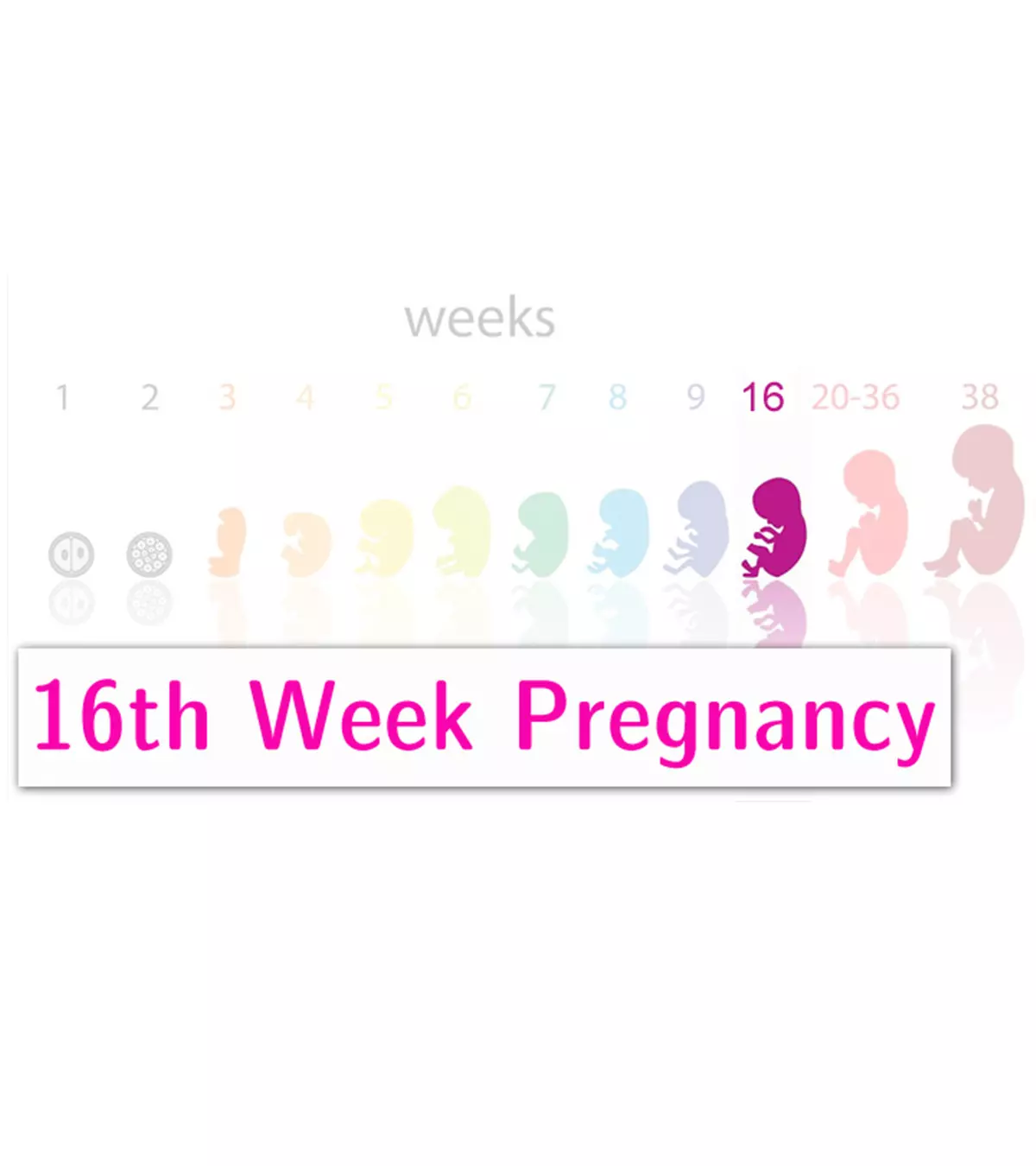
Image: Shutterstock

Congratulations on making it halfway through your journey if you’re in your 16th-week pregnancy! There is more that awaits you in the next few weeks! During this week, your baby is the size of an avocado, and you are in your second trimester. You can also hear your baby’s heartbeats in your ultrasounds and checkups.
And it is also essential to learn about your baby’s developmental milestones while still in the womb. So read on as we give you more information about your baby’s growth during this period and a few tips for your partner.
Key Pointers
- During the 16th week of pregnancy, the baby’s skin becomes more transparent and their muscles and bones become more organized.
- At this stage, the baby is the size of an avocado and the shapes of their lips and eyes become more precise.
- The mother’s skin may become more radiant, but she may also experience backache, constipation, and leg cramps.
- Other changes like an increase in belly size and forgetfulness are common in pregnant women during this week.
- Eating the right foods, getting regular exercise and ample rest are some ways to cope with these changes effectively.
How Big Is Your Baby At Week 16?
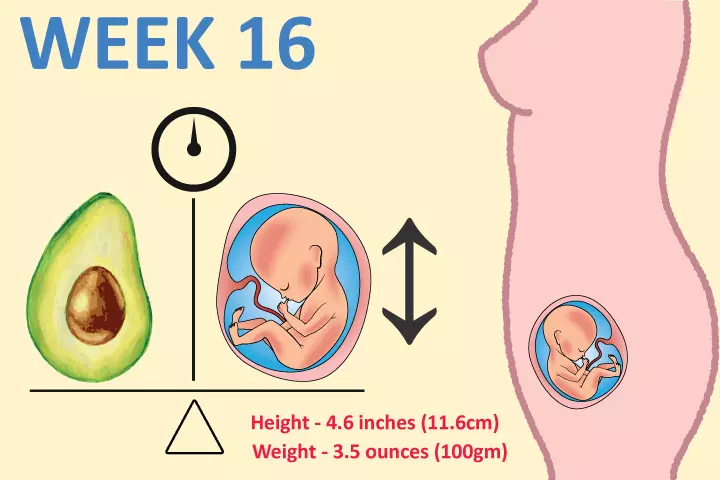
Your baby size is about the size of an avocado (1) and could fit in the palm of your hand. She measures 4.6 inches (11.6cm) and weighs 3.5 ounces (100gm).
Baby Development In Week 16 Of Pregnancy
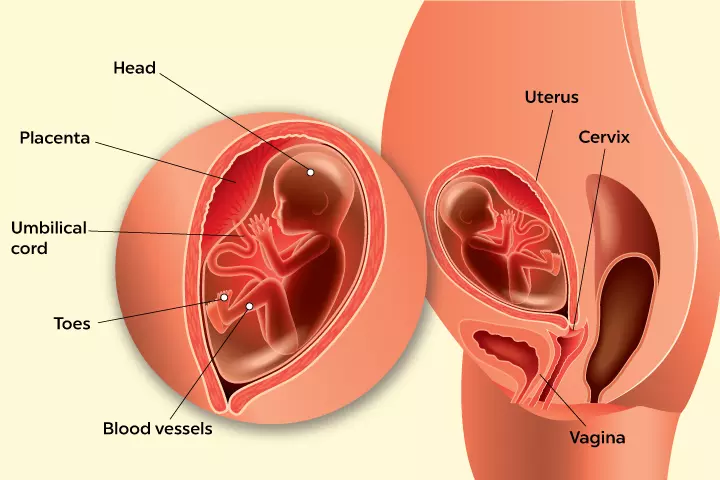
. The following listed features are from the book, The Complete Pregnancy Guide for Expectant Mothers by Alex A. Lluch and Dr. Benito Villanueva (2).
Skin: The skin is transparent and pink and shows blood vessels beneath.
Limbs: Tiny feet can kick and hands make grasping motions. Toe nails start growing and the baby can now suck the thumb.
Eyes: They become increasingly sensitive to light.
Lip: A vertical groove called philtrum or medial cleft begins to appear in the middle of the upper lip, which gives it a distinct Cupid’s bow shape.
Musculoskeletal system: The muscles and bones get organized and the facial muscles move giving way to facial expressions.
Nervous system: It continues to develop, and your baby will have reflexes, thanks to neural control. The baby will also grab and play with the umbilical cordiA tube-like structure that delivers oxygen and nutrition to the fetus in the womb .
Head and scalp: Head and neck become more erect as the backbone strengthens. The scalp pattern appears though the locks are not visible yet (called patterning of the scalp).
Heart and blood flow: Heart pumps about 25 quarts of blood every day, and this fraction increases as the baby develops.
Placenta: It grows to accommodate several blood vessels, which help in the exchange of oxygen and nutrients.
If you are carrying twins, the development of twin fetuses will be the same as above along with the following symptoms:
- Your twins’ fingernails grow and unique fingerprints are almost formed.
- If you spot one of the babies sucking their left thumb in an ultrasound scan, chances are they may be left-handed.
- Genitals are formed allowing the sonographeriA medical professional who specializes in using the ultrasound imaging technique to recognize their gender easily. Girl fetus will have millions of eggs in her ovaries.
- Their bodies grow faster than the heads. Skin is covered with downy hair, referred to as lanugo, which disappears before birth, but a few babies have it ever after birth.
- All the limbs and joints move. The skeletal system is soft now, made of rubbery cartilage, and hardens slowly.
- Chests move up and down and mimic breathing. They take in amniotic fluidiClear, yellowish liquid surrounding and protecting the fetus during pregnancy in place of air.
16th Week Pregnancy Symptoms and Changes in Your Body
During the 16th week here is what you might notice:
First kicks: You can feel your baby’s kicks during pregnancy and the fetal movement as well. These kicks are called flutters or quickening and can be mistaken for indigestion or stomach rumblings (3).
Bigger breasts: The breasts will grow big as they are prepping up for nursing.
Pregnancy glow: The increased blood flow during this time makes your face look bright and the active hormones will make your skin oilier and shinier. This is called pregnancy glow (4).
 Quick fact
Quick factBackache: The hormonal changes can increase the risk of back pain. You may need some low-impact exercises to ease the pain. Also, sit and stand, and stretch your body regularly to alleviate the pain. But before trying anything, check with your doctor.
Constipation: Besides pregnancy hormones making the gastrointestinal tract inactive, the growing uterus puts pressure on the bowels leading to constipation during pregnancy. Have lots of water and take high fiber foods to beat the condition.
Vaginal discharge: This continues to increase, and is good as it protects the vagina from infections. You may be tempted to use douches or wipes but avoid them to prevent genital tract infections and irritations.
Varicose veins: The growing uterus compresses blood vessels causing painful varicose veins. Managing your weight is a must as extra weight gain could increase the load on the circulatory system, leading to varicose veins. Also, do not stand in the same position for a longer time, and keep your feet elevated when sitting (5).
Bleeding gums: You will notice bleeding gums after brushing as pregnancy hormones cause inflammation, which makes gums susceptible to bleeding, irritation, and bacteria. Good oral hygiene and dentist visits are a must.
Leg cramps: You may suffer from severe leg cramps and pain. Moving and exercising your legs, feet, and ankles can help prevent cramps.
Heartburn: Progesterone helps in expanding your body with the growing baby. It also slows down the movement of food along the digestive system and causes heartburn. Take smaller meals at frequent intervals rather than larger meals three times a day. Avoid eating spicy foods and lying down soon after meals.
Nosebleeds: It may seem alarming, but nosebleeds during the 16th week are due to the additional blood flow in the tiny blood vessels of the nose which rupture easily. Use a humidifier or a neti pot to moisten your dry nose.
Forgetfulness: You may become a little forgetful or face trouble concentrating. Though the actual reason is not known, “PregnancyBrain” could be biological or a result of the endless thoughts in your mind.
Dry and itchy eyes: Another effect of pregnancy hormones, dry and itchy eyes can be treated with over-the-counter eye drops only after consulting your healthcare provider.
If you happen to find any other symptoms during the 16th week, you should let your doctor know about them.
 Be watchful
Be watchfulHow Is Your Growing Belly?
You may be a pound heavier thanks to the extra poundage of blood and fluid volume. At this stage, your uterus holds almost a cup of amniotic fluid.
Your Second OB/GYN Visit
You will have your second prenatal appointment around this time.
Medical history: Your doctor will check your general health and take details of any symptoms you may experience. You must tell the doctor of any issues or queries you have.
Physical examination: Your blood pressure, weight, and height are measured. Physical examination also includes checking thyroid, breasts, lungs, and heart along with abdominal and vaginal examination.
Lab tests: Your doctor will check for signs of gestational diabetes and blood test, preeclampsiaiA pregnancy disorder characterized by high blood pressure, water retention, and protein content in urine investigation, or any urinary tract infections through urine tests.
Doppler ultrasound test: Your ob-gyn will use a handheld device called Doppler to make you and your partner hear the baby’s heartbeat for the first time, which will become a routine hereafter.
Tests and procedures: You may have to undergo a few procedures for detecting congenital disabilities or genetic disorders and abnormalities.
- Multiple marker screening: It is a blood test that detects Down syndrome. It uses certain markers which provide information on congenital disabilities such as spina bifida (6). The Centres for Disease Control and Prevention (CDC) estimates that one in 700 newborns, or around 6,000 babies born in the United States each year, have Down syndrome. This test is also done in combination with a special ultrasound scan known as nuchal translucency screeningiUltrasound test that helps detect congenital conditions such as Down’s syndrome in a fetus during pregnancy (11-13 week) and Level II scan (18-20 weeks) to better assess any abnormality risks.
- Amniocentesis: It diagnoses Down syndrome and chromosomal abnormalities, neural tube defects, and genetic disorders. However, this holds a small risk of miscarriage. Therefore only those who are known to be at greater risk of genetic or chromosomal abnormalities should go for it (7).
- Alpha-fetoprotein (AFP) tests: AFP blood test checks for potential genetic disorders and any neural tube defects (8).
 Point to consider
Point to considerGender Scan On Ultrasound
A boy ultrasound looks like a snail or turtle.
A girl ultrasound has three distinct lines (outline of vulva – the external part of the female genitalia). But a better visual can only be obtained when the fetus reaches 20 weeks as gender differences are definite then.

Image: IStock
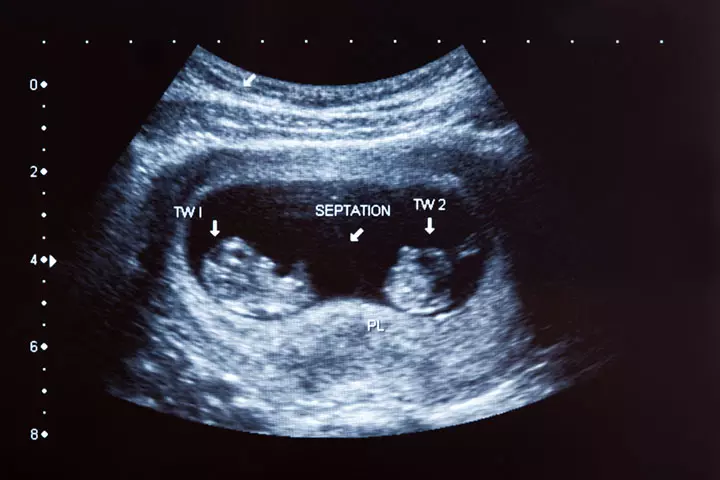
Image: Shutterstock
9 Tips For A Better 16th Week Pregnancy
With the nausea and morning sickness gone, this is a good time to focus on healthy eating and remaining fit.
- Eat right: If you are craving for sweet foods, you can have yogurt or fruit instead of candies. If you want to have salty foods, snack on string cheese. They not only satisfy your pregnancy cravings but also fulfill calcium and protein needs. However, not all women experience pregnancy cravings. Abi Porter, a blogger mother shares, “I haven’t experienced cravings yet, but I am 100x more thirsty (i).”
- Exercise: A half-hour workout is a good idea. Walking and swimming are better options for low-intensity activities, but do discuss with your doctor before trying any exercise. Genevieve Howland, a breastfeeding advocate and childbirth educator, shares more about the improvement she observed in her energy levels when compared to the first trimester. She says, “I feel like I can go on full-day excursions. I’ve started walking and it feels great to just move my body and get some exercise because literally in the first trimester, I did not move unless I had to (ii).”
- Research: Start looking out for cribs, strollers, baby car seats, and other baby items. Baby shopping could be difficult once the little one is born. At the same time, do not forget yourself. Indulge in some retail therapy and buy yourself some cute and trendy maternity clothes.
- Sleeping on side: From this week onwards, sleeping positions become more crucial, and it’s not advisable to sleep on your back. You could use pillows for support while sleeping on your side or buy maternity pillows designed specially for pregnancy. Sleeping on your sides may not be comfortable for all pregnant women. “I’m not loving trying to sleep on my sides. I’ve been a stomach sleeper all my life and everything else is so uncomfortable to me, adds Porter.”
- Childbirth education: Your ob/gyn may ask you to enroll in childbirth education classes to cope up with stress and anxiety, and other feelings that affect you.
- Communication: Share your fears and anxiety with your partner. It will help you to come out of it, and also your partner will understand what you are going through. Communication is crucial during pregnancy for both of you to understand each other.
- Make the journey amazing: Looking for baby names can fill you with excitement. It can also be a de-stressing activity. Creating a baby registry is another exciting and stress-relieving activity that you can enjoy while preparing for your little one’s arrival.
- Decisions matter: Be firm on any decisions you take, whether they pertain to your health, finances, or the baby.
- Fun with the bump: Now that your baby bump is showing, you can take pictures and even make stop animation movies. You could stand in the same place and position every day and take pictures to create your own little movie.
Nutrition In 16th Week Of Pregnancy
According to the American Center for Disease Control (CDC), you need to have an extra of 340 calories every day from your second trimester(9)
. However, it depends on your weight and the level of activity.
If you are overweight or obese, then these suggestions could help:
- A nutritious breakfast should be your first meal. It should contain the right amount of protein, fiber, complex carbohydrate, and some healthy fats.
- Take whole grains, low-fat dairy products, vegetables, and lean meat. Avoid processed foods, sugar-loaded desserts, and packaged snacks.
- Keep filling and healthy snacks such as hummus, plain yogurt, nut butter, baby carrots, some raw veggies, and fresh fruits such as apples, pomegranates, bananas, handy. This way, you are less likely to eat junk.
- Replace fatty foods with non-fat frozen yogurt, bagel or air-popped popcorn instead of ice cream, doughnuts, or potato chips.
- Drink water rather than a glass of juice or beverages.
If you are underweight, normal, or facing difficulty in putting on weight, then try the following nutritional tips:
- Have a milkshake every day for the calorie boost.
- Include healthy fats such as nuts and avocados in your diet.
- Eat dry fruits rather than fresh fruits as they are filling and healthy.
- Eat snacks in between meals.
If you still have trouble putting on weight or have eating disorders, talk to your healthcare provider for alternative suggestions.
Tips For Dad-To-Be
- When your partner begins to feel the baby’s movements, you will want to feel them as well. You may not be able to feel them, but you could read or sing to your baby as this gets your baby to be familiar with your voice. Evidence suggests that a fetus can start responding to sounds as early as 16 weeks (10).
- Continue to show your love for her during this beautiful phase so as to win her love for a lifetime.
- Your partner’s body undergoes many physical changes which may upset her. You can make her feel good by being positive.
Activity That You Can Take Up: Book a Babymoon
Enjoy the freedom of holidaying that could be one last trip for two of you. Moreover, the second trimester can be an ideal time for traveling. Once you cross this stage, you can hardly plan any activity or enjoy together.
Pregnancy Checklist at 16 Weeks
A few quick reminders for the week –
- Schedule the next 20-week prenatal appointment
- Schedule for a mid-pregnancy ultrasound
- Start making a baby name list
Frequently Asked Questions
1. How much weight should you gain in the 16th week of pregnancy?
If you were at a healthy weight when you started your pregnancy, try to gain around 12 to 14 pounds in this trimester (that is towards a total of 25 to 35 pounds for your entire pregnancy). If you were underweight, overweight, or carrying twins or more, your doctor may advise you to gain a little more or less.
2. How can you keep your weight gain on track?
According to American CDC pregnancy weight gain guidelines, you should eat about 340 calories every day in your second trimester. However, the caloric requirement depends on your weight and activity level.
3. How many months is 16 weeks?
16 weeks is four months or the end of four months of pregnancy.
4. If I am 16 weeks pregnant, when is my due date?
Your due date is usually calculated by adding 40 weeks (i.e., 280 days) to the first day of your last period (if you assume a 28-day menstrual cycle). So, if you are 16 weeks pregnant now, you will be delivering your baby 24 weeks later. If you deliver on the expected due date, your baby will be 38 weeks, not 40 since your last menstrual period and ovulation are taken as the first two weeks of your pregnancy.
5. At 16 weeks, what are the best prenatal vitamins to take?
Pregnant women are usually prescribed 10mg of vitamin D and 400mg of folic acid daily from preconception to birth as a part of their prenatal care. In addition, around the 16th week, it is important you have an adequate intake of iron, vitamin c, and calcium (11).
6. What activities or exercises should I avoid during my 16th week of pregnancy?
Pregnant women should avoid high-intensity exercises or high-impact aerobics. In addition, activities such as rock climbing, rollerblading, running, diving or skiing, or contact sports must preferably be avoided as they carry a high risk of injuries (12).
The 16th week of pregnancy brings several changes in you and your baby. During this period, your breasts grow bigger, the bump is likely to become noticeable, and you may also experience fluttering. On the other hand, your baby will grow bigger, and the development of essential organs and senses will continue further. Thus, eating a well-balanced diet, regularly exercising, and sleeping on the side are a few steps you should follow to ensure your pregnancy progresses smoothly.
Infographic: Tips For A Better 16th-Week Pregnancy
During the 16th week of pregnancy, it’s important to prioritize self-care and prepare for the upcoming stages of pregnancy and childbirth. This week, try to take care of yourself and seek support when needed. The infographic below provides a list of suggestions to keep a note of during this time to have a healthy and happy pregnancy. Be sure to take a look and consider incorporating them into your routine.
Some thing wrong with infographic shortcode. please verify shortcode syntax
Illustration: Weeks Pregnancy: Symptoms Tips And Baby Development

Image: Dall·E/MomJunction Design Team
Personal Experience: Source
MomJunction articles include first-hand experiences to provide you with better insights through real-life narratives. Here are the sources of personal accounts referenced in this article.
i. 16 Weeks.https://vanillaandlace.blogspot.com/2013/06/
ii. My Pregnancy @ 16 Weeks + Belly Shot.
https://www.youtube.com/watch?v=_R_bTkX1qSE
References
- Week 16 of Pregnancy: What’s Going On Inside.
https://healthy.kaiserpermanente.org/health-wellness/health-encyclopedia/he.week-16-of-pregnancy-what%27s-going-on-inside.abr7110 - The Complete Pregnancy Guide for Expectant Mothers: Everything a Mom Needs.
https://books.google.co.in/books?id=mcngQnmP_KYC&printsec=frontcover#v=onepage&q&f=false - Baby movements during pregnancy.
https://www.pregnancybirthbaby.org.au/baby-movements-during-pregnancy - Pregnancy Glow.
https://americanpregnancy.org/healthy-pregnancy/changes-in-your-body/pregnancy-glow/ - 16 weeks pregnant – all you need to know.
https://www.tommys.org/pregnancy-information/im-pregnant/pregnancy-week-by-week/16-weeks-pregnant - Multiple Marker Screening Test (MMS).
https://www.pennmedicine.org/for-patients-and-visitors/find-a-program-or-service/obstetrics/prenatal-genetic-testing/diagnosis-and-screening-services/multiple-marker-screening-test-mms - Amniocentesis.
https://www.hopkinsmedicine.org/health/treatment-tests-and-therapies/amniocentesis - Alpha-Fetoprotein Test (AFP).
https://americanpregnancy.org/prenatal-testing/alpha-fetoprotein-test/ - Weight Gain During Pregnancy.
https://www.cdc.gov/maternal-infant-health/pregnancy-weight/?CDC_AAref_Val=https://www.cdc.gov/reproductivehealth/maternalinfanthealth/pregnancy-weight-gain.htm - Hearing in the Womb.
https://lozierinstitute.org/dive-deeper/hearing-in-the-womb/#:~:text=The%20earliest%20evidence%20of%20a,between%2025%20and%2025%20weeks.&text=Later%20in%20pregnancy%2C%20the%20fetus,Bi%2DBa%E2%80%9D. - Vitamins, supplements and nutrition in pregnancy
https://www.nhs.uk/pregnancy/keeping-well/vitamins-supplements-and-nutrition/ - Activities to Avoid During Pregnancy
https://americanpregnancy.org/healthy-pregnancy/is-it-safe/activities-to-avoid-during-pregnancy/ - 16 Weeks Pregnant: Feeling the Baby Move
https://www.healthywomen.org/your-health/pregnancy–postpartum/16-weeks-pregnant-symptoms-and-signs - What happens in the fourth month of pregnancy?
https://www.plannedparenthood.org/learn/pregnancy/pregnancy-month-by-month/what-happens-fourth-month-pregnancy#:~:text=Breast%20changes%20%E2%80%94%20growth%2C%20soreness%2C,%2C%20nosebleeds%2C%20or%20nasal%20stuffiness
Community Experiences
Join the conversation and become a part of our nurturing community! Share your stories, experiences, and insights to connect with fellow parents.
Read full bio of Dr. Anita Gupta
Read full bio of Sakshi Mishra
Read full bio of Rebecca Malachi
Read full bio of Aneesha Amonz






